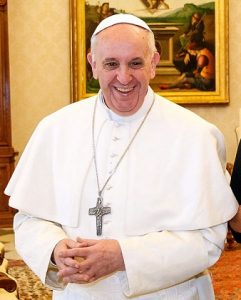The Pope and the billionaires. I have not seen too much news coverage of this, but Pope Francis met earlier this month with some of the world’s wealthiest business people. The Fortune-Time Global Forum, convened in Rome by Time and Fortune magazines, focused on the Pope’s call for a fundamental renewal of the global economic system to better meet the needs of all people throughout the world. The Pope urged broader prosperity and the “centrality and dignity of the human person.” 
The Pope further pleaded with the likes of Virgin’s Richard Branson, LRN’s Dov Seidman, and Joe Kaeser from Siemens “to take seriously their personal obligation to share their resources and make a real commitment to doing business in a way that helps other people realize their potential, too.” The CEOs and “heads of major nongovernmental organizations participated in working groups to develop practical commitments aimed at increasing people’s access to finance, health care, the internet, energy, food, clean water, education and job training.”
The December 12, 2016, issue of Time highlighted the ideas of some of the participants.
- Ginni Rometty, CEO of IBM, spoke about creating ‘new’ collar jobs. Companies must create and hire to fill entirely new kinds of jobs, which are coming about due to globalization and technology. Part of the process includes creating new education models, such as six-year public high schools that include community college work. Rometty concludes, “The market alone will not solve this problem; we need collaboration across business, government and civil society. The future of job creation is no longer white collar vs. blue collar. It’s new collar.” Note that this is a model long used successfully in other advanced nations, as noted by Steven Hill in Europe’s Promise.
- Vice Chairman of GE John Rice offered ideas on building the workforces businesses need. Instead of throwing up one’s hands in resignation about current educational systems not adequately preparing workers for future skills, businesses need to “double down on being part of the solution.” Rice mentions retraining workers whose jobs are displaced by technology and developing work-study programs in conjunction with academic institutions and vocational programs. “[T]he goals of private companies and the public are the same: a business supports those whose jobs are impacted by technology.”
- Marcelo Claure, CEO of Sprint, noted the lack of broadband internet access in some US communities and offered suggestions. Claure points out distressingly that, when most teachers in the US assign internet-based homework and vast numbers of their students do not have internet access at home, those students are greatly disadvantaged by this homework gap. Claure states that his company is willing to tackle this issue, and it should be noted that European nations are quite far ahead of the US with regard to technology and internet access.
Forums like this, where a moral authority such as the Pope inspires powerful leaders whose lives revolve around the profit motive, are timely punctuation points at this point in our history. Both the Pontiff and the CEOs recognized the great good that has come about for millions around the world by technological and other advances. But they also acknowledged what became crystal clear during the recent US presidential campaign: the gross income inequality that has been exposed and the turmoil, despair and extremism that result when many of the disenfranchised feel ignored.
It is not enough for wealthy heads of global businesses to be good, ethical individuals; they must also wield their enormous power to better the lot of people who may never buy their products or services. The CEOs at the Forum seemed to recognize “that leadership that accepts that the long-term sustainability of our actions is more important than short-term gain.” One hopes that the examples and ideas of these powerful men and women will spread to others and that innovations that are already in place will be highlighted and celebrated.
Resource
Hill, Steven. Europe’s Promise: Why the European Way is the Best Hope in an Insecure Age. Berkeley and Los Angeles, CA: University of California Press, 2010.
